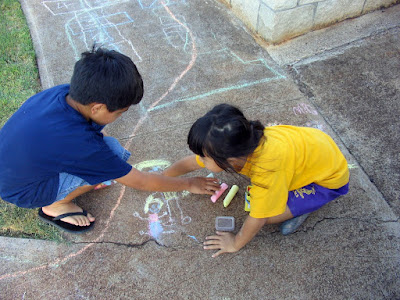CELEBRATE!— The Week of the Young Child – April 19 – 25
Monday, April 20, 2009
This week highlights the knowledge gained from scientific research that demonstrates that the experiences young children receive in the first three years of life are crucial to brain development. These studies prove that brain development is determined by the daily environment and experiences, rather than genetics alone. This as so exciting to realize, it means we can easily ensure each child has a well developed brain!!
Our increasingly technically and socially complex society cannot afford to continue to allow large numbers of children to miss out on the positive experiences they need in infancy and early childhood; the costs of lost potential and increased rates of emotional and behavioral problems, are too high. Brain research show us what children need; we just need to guarantee that every child receives it!
Celebrate the Week of the Young Child by making a difference. Simple ideas to promote this week are to tell your friends, family, coworkers, and neighbors what you've learned about brain development, donate books or a game to a preschool program, contact your representative to encourage support of programs for children and families, read to a child waiting at a food pantry, or simply compliment a parent you observe having a positive interaction with their child.
Happy Week of the Young Child!
INTERACTION IS BEST FOR EARLY BRAIN DEVELOPMENT
Thursday, March 19, 2009

Christakis, a researcher on this issue states, “if you want to stimulate your baby’s brain try simply playing with him.” In a recent study, Christakis showed that basic activities like playing with blocks, can improve an 18-month old’s language skills six months later.
Experts worry that time spent watching television and even baby designed DVDs will continue to replace what babies need most in the first months of life, which face time with human beings. “Every interaction with our child is meaningful,” says Christakis. “Time is precious in those early years, and the new born is watching you, and learning from everything you do.”
Brain Insights activity packets provide the type of ideas parents are looking for to easily provide fun interactive learning experiences in everyday life. For more information on these unique packets visit www.BrainInsightsonline.com
BRAIN DEVELOPMENT HAPPENS THROUGH FUN!
Monday, March 16, 2009
Isn't it great that learning doesn’t have to be serious? Scientific research proves the importance of play in early brain development! Watching this video clip demonstrates the valuable learning that can take place while have lots of fun. (You will probably have fun yourself just from watching this!)
This clip shows the valuable interactive experience this baby is having through simply ripping paper! It illustrates that to provide learning experiences a child does not need to have expensive, flashing toys. Many connections are made in this baby’s brain through a very fun and repeated activity that costs nothing.
Play and laughter activates the care and thinking areas of the brain. These important brain areas are strengthened by having these types of experiences often. It is apparent through watching this, the baby is learning. You can see, through repetition he learned what to expect before the paper was ripped.
WHY IS BRAIN DEVELOPMENT AWARENESS SO IMPORTANT?

The experiences young children receive in the first three years of life are crucial to brain development. When a child receives loving care and stimulation, connections are formed between brain cells. These connections physically wire the brain. It is primarily the early experiences that largely determine the strength and function of the brain's wiring system. Warm responsive parents, who cuddle and talk to their children and provide fun learning experiences, promote healthy brain development for their children.
Technology allows the study of the brain, like we've never seen before. Scientific research demonstrates that a child's early development is determined by his daily environment and experiences, rather than genetics alone. For us to provide the best for all children, we must all understand how a child's brain works and develops. It is critical that this information becomes common knowledge.
Our education system and entire society cannot afford to continue to allow large numbers of children to miss out on the positive experiences they need in infancy and early childhood; the costs in terms of lost potential and increasing rates of emotional and behavioral problems, are too high. Brain research show us what children need; our challenge is to ensure that every child receives it!
Photo by Anissa Thompson
HAPPY BRAIN AWARENESS WEEK!

Throughout this week I am asking everyone that cares about young children to help create further awareness!! It is so important that everyone understands the fantastic opportunity we have to positively impact the development of young children’s brains.
All it takes is loving interactions and opportunities to play with the people in a child’s life!!
Imagine a world where this knowledge is applied for every child! What a difference it would make now and in the long term. We all benefit from children with well developed brains!!
This week start the habit of talking to people you work with, your neighbors, your family members, and even the person that cuts your hair about the importance of early brain development! Have fun!!
To do my part in creating awareness about early brain development, I will be posting a series of blogs regarding brain development research each day during Brain Awareness Week. To make sure you don’t miss out, subscribe to the blog. Also, during this week, I will be offering a 25% discount on brain development activity packets. Learn more about the packets at http://www.braininsightsonline.com/
Happy Brain Awareness Week!
THE INCREDIBLE VALUE OF PLAY IN EARLY BRAIN DEVELOPMENT!
Tuesday, March 10, 2009

The article, The Serious Need for Play, published in Scientific American, refers to numerous studies that demonstrate the value of play. The article points out that play adds to the development of better language and social skills. Evidence also show that play is effective in the reduction of stress. And additionally, play also is shown to make kids smarter.
Too often it is thought that the best way to help children develop is to plan structured activities. David Elkind is quoted in this article saying, “Play has to be reframed and seen not as an opposite to work but rather as a complement.” He also says, “Curiosity, imagination and creativity are like muscles: if you don’t use them, you lose them.”
The Brain Insights activity packets, I have developed, are designed with this understanding of early brain development in mind. For example:
PHYSICAL PLAY
When I am in an active mood, lay on the floor and let me crawl over you. Let me have a fun time while giving me safe physical play time with you.
Studies show gentle rough and tumble play helps the development of the thinking areas of the brain.
TIME TO JUST PLAY
Let me have time to just play, be creative and use my developing imagination. Provide items that are safe for me to use around the house. You might be amazed at the creative things my brain comes up with if I have free play time.
Items to get play started: Put a blanket over a table, give me plastic kitchen containers or utensils, junk mail, packing peanuts, cardboard boxes, etc.
My brain will learn to imagine, and to be curious and creative by having lots of opportunities to just play. Play experiences with real things on my own or with friends helps me also develop problem solving skills.
TIME TO EXPLORE
In addition to the time we spend playing together, let me have time to also play on my own. Watch for times when I am very interested in an activity and let me enjoy it as long as I am interested.
My brain needs to explore things over and over. When I do this my brain learns what to expect from different things I try. Playing alone gives me important time to discover for myself how things work.
You can have play ideas right in your pocket with Brain Development Activity Packets! Even though your life is busy you can have fun times with your child at any time! (In English and Spanish)
BRAIN INSIGHTS FOR READ ACROSS AMERICA DAY!
Monday, March 2, 2009












